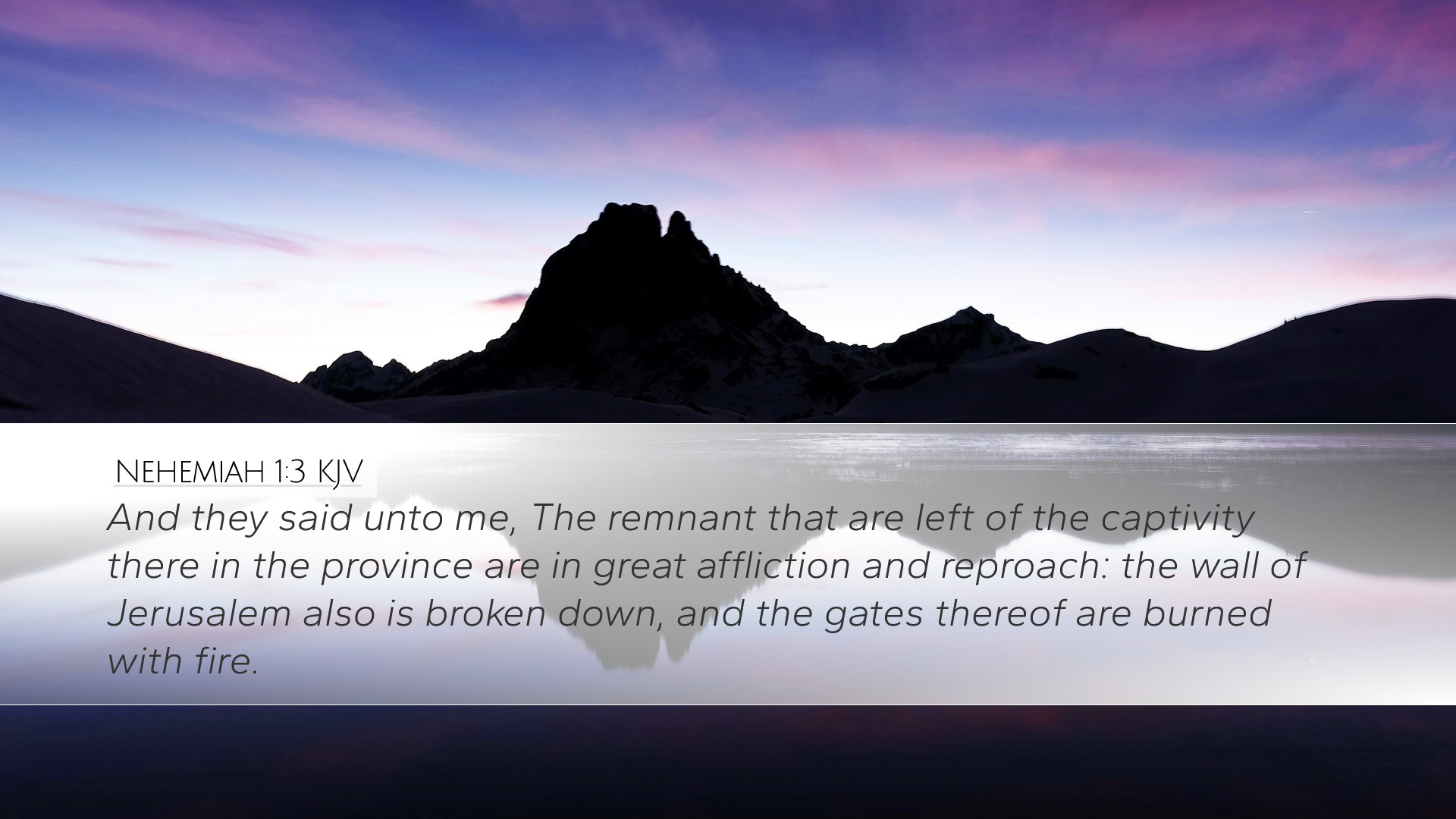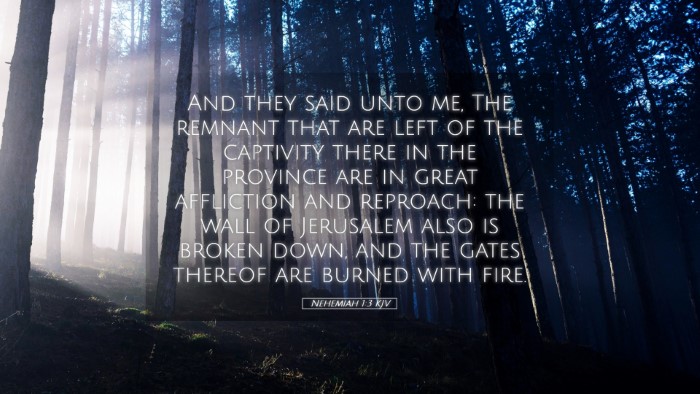Old Testament
Genesis Exodus Leviticus Numbers Deuteronomy Joshua Judges Ruth 1 Samuel 2 Samuel 1 Kings 2 Kings 1 Chronicles 2 Chronicles Ezra Nehemiah Esther Job Psalms Proverbs Ecclesiastes Song of Solomon Isaiah Jeremiah Lamentations Ezekiel Daniel Hosea Joel Amos Obadiah Jonah Micah Nahum Habakkuk Zephaniah Haggai Zechariah MalachiNehemiah 1:3
Nehemiah 1:3 KJV
And they said unto me, The remnant that are left of the captivity there in the province are in great affliction and reproach: the wall of Jerusalem also is broken down, and the gates thereof are burned with fire.
Nehemiah 1:3 Bible Commentary
Commentary on Nehemiah 1:3
Text of the Verse: "And they said unto me, The remnant that are left of the captivity there in the province are in great affliction and reproach: the wall of Jerusalem also is broken down, and the gates thereof are burned with fire."
Introduction
The book of Nehemiah chronicles the efforts of Nehemiah, a Jewish cupbearer to the king of Persia, as he responds to the dire condition of Jerusalem. Nehemiah 1:3 serves as a pivotal moment in which Nehemiah learns of the distressing situation of his fellow Jews in Jerusalem. This commentary seeks to merge insights derived from esteemed public domain scholars to provide a comprehensive understanding of this verse.
Contextual Background
Understanding the historical and spiritual context surrounding this verse is crucial. After the Babylonian exile, the Jewish people were allowed to return to Jerusalem, but the physical and moral state of the city remained in ruins. The broken walls and burned gates symbolize not only physical desolation but also spiritual degradation, leading to God's anger and the people's shame.
Insights from Matthew Henry
According to Matthew Henry, this verse encapsulates the misery and disgrace the captives felt. Henry observes that the physical ruin of Jerusalem reflects a deeper spiritual issue among the Jewish people. The walls, which ought to stand as a symbol of God's protection, are destructed, illustrating their abandonment of faith and divine covenant. Henry emphasizes the profound desolation represented in this verse:
- Affliction and Reproach: The remnant is characterized by their vulnerability and public shame.
- Symbolism of the Wall: The wall’s destruction signifies a lack of security and identity for the Jewish people.
Insights from Albert Barnes
Albert Barnes expounds on the societal implications of the conditions described in Nehemiah 1:3. He notes that Jerusalem's state mirrors the state of the Jewish people, both physically and spiritually. Barnes outlines the following points:
- Desolation of the City: The phrase "great affliction and reproach" highlights not only the suffering of the people but also the dishonor it brings to the name of Israel.
- Urgency for Restoration: Barnes asserts that the dilapidated state of Jerusalem creates a critical need for restoration, both to preserve Jewish identity and ensure the worship of God.
Insights from Adam Clarke
Adam Clarke provides an analysis that emphasizes the emotional weight of Nehemiah's response to the news of Jerusalem. He draws attention to the divided nature of the Jewish populace, where some have returned to their homeland while others continue to remain in exile:
- The "Remnant": Clarke explains that the term "remnant" refers to those who escaped the captivity and returned to Jerusalem. They represent hope amidst despair.
- Call to Action: Nehemiah's grief over Jerusalem's state propels him into intercession and action, showing how personal sorrow can lead to communal restoration.
Theological Implications
From the combined insights of these commentators, several theological implications can be discerned:
- The Nature of Suffering: The affliction of the Jewish remnant speaks to the communal aspect of suffering in the faith community.
- Divine Fidelity: God's responsiveness to His people’s suffering highlights His fidelity to the covenant, even in their failures.
- Call to Restoration: The conditions in Jerusalem present a call for restoration, both in physical and spiritual terms, emphasizing the comprehensive nature of God's redemption.
Application for Today
The passage serves as a poignant reminder to modern believers about the condition of God’s people and the crucial role individuals can play in the restoration of the church and community. Here are a few applications:
- Awareness of Desolation: Believers are encouraged to recognize and acknowledge the spiritual and physical desolation within their communities.
- Intercessory Prayer: Like Nehemiah, there is a call to prayer and action in times of communal distress, which can involve seeking God’s help and mobilizing resources for restoration.
- Personal Involvement: The call for restoration extends to personal participation in nurturing and rebuilding faith within the community.
Conclusion
Nehemiah 1:3 is rich with significance, showcasing not only the historical realities faced by the Jewish people post-exile but also the spiritual truths that emerge from their suffering. The insights of Matthew Henry, Albert Barnes, and Adam Clarke collectively shed light on the deep-seated issues of affliction, identity, and the urgent need for restoration. This commentary serves as both a historical analysis and a contemporary call to action for all who seek to follow God’s purpose amid despair.


